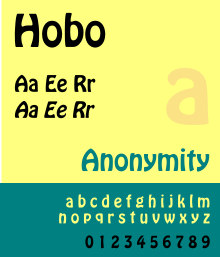Hobo is a sans-serif typeface. It is unique for having virtually no straight lines or descenders. It was created by Morris Fuller Benton and issued by American Type Founders in 1910. A light version, Light Hobo, was released in 1915. Matrices were offered for mechanical composition by Intertype. The lower case letters provided the basis for Robert Wiebking's Advertisers Gothic of 1917.[1]
 | |
| Category | Sans-serif |
|---|---|
| Classification | Display |
| Designer(s) | Morris Fuller Benton |
| Foundry | American Type Founders |
| Date released | 1910; 113 years ago |
| Re-issuing foundries | Intertype |
| Trademark | 1915 |
This font may have originally been intended as an Art-Nouveau font due to its resemblance to other fonts of the time.
There are several theories regarding the font's name, and in fact it is widely recognized as one of the more interesting mysteries in typographic history.[2] One theory states that its name came from a story stating that it was sketched in the early 1900s, sent to the foundry nameless, and progressed so little for so long, that it was called "that old hobo". Hobo, originally called Adface, was finally patented in 1915 along with Light Hobo.[3] The prevailing bow-legged shape of the letterforms inspired another long-held theory that it was so named because they resembled those of a bow-legged hobo.
The most complete and most plausible theory, by Peter Zelchenko, demonstrates how Benton, who lived and worked near a large Russian community, must have seen a particular cigar poster spelling what appears to read like "HOBO!" ("ново", Russian for "New!").[2] The poster's hand-lettering of the word bears striking and unique resemblances to the font; the shape of the O at the extreme right of the poster was probably traced by Benton to match his own Capital O precisely, and those shapes helped define the design of the font.
Digital versions of this face are often found in Mac OS and Microsoft Windows systems.
Usage in popular culture
editHobo was used as the main typeface in the title sequence and promotional materials of the 1969 film Butch Cassidy and the Sundance Kid.[4]
Hobo was used in the opening titles of The Dukes of Hazzard.[citation needed]
Hobo was used as the main typeface in the title card sequence of Winx Club.[citation needed]
Hobo was used as the long closing credits of Tic-Tac-Dough.[citation needed]
Around the sixth generation of video game consoles, Hobo was used in the Spyro franchise, as seen in The Legend of Spyro: A New Beginning and The Legend of Spyro: The Eternal Night, and for the logo of several Frogger subseries, including Frogger: The Great Quest and Frogger's Adventures: The Rescue.[citation needed]
Hobo was used as the opening and ending credits of the popular television show That '70s Show.[citation needed]
Hobo was used in Pantages Theatre's logo.[citation needed]
Hobo was used in the logo of Ubu Productions from 1982-2002.[citation needed]
Hobo also gets used in the Bon Appétit test kitchen videos.[5][6][circular reporting?]
Hobo was used in "Signing Time!".[citation needed]
Hobo was used in the ending credits of Polka Dot Door (sometimes).
Hobo was used in the opening and ending credits of Czech stop motion series Pat & Mat (episodes from 2000-2004).
Hobo was used on the back cover of American experimental hip hop group Death Grips's 2018 album Year of the Snitch.
Hobo is used for the dialogue of some characters in Madness: Project Nexus.
References
edit- ^ "Advertisers Gothic lower case sample".
- ^ a b Zelchenko, Peter (21 March 2014). "The true story behind the Hobo font". Retrieved 9 January 2016.
- ^ McGrew, Mac (1993). American Metal Typefaces of the Twentieth Century. Oak Knoll Books. p. 181. ISBN 0-938768-39-5.
- ^ Landekic, Lola (February 18, 2014). "Butch Cassidy and the Sundance Kid (1969) — Art of the Title". Art of the Title. Retrieved May 15, 2014.
- ^ @EveIraMurray (20 April 2020). "what font do you use for 'wourder'?" (Tweet) – via Twitter.
- ^ @matthunzi (20 April 2020). "http://en.m.wiki.x.io/wiki/Hobo_(typeface)" (Tweet) – via Twitter.